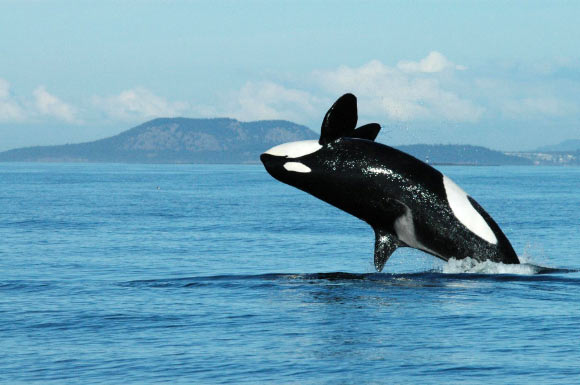Postmenopausal female killer whale (Orcinus orca) have a big beneficial impact on the survival chances of their grandoffspring, a University of York-led study has found. Published in the Proceedings of the National Academy of Sciences, the findings can help explain why killer whales have evolved the longest postreproductive life span of all non-human animals.

Spieden J8, a 72-year-old killer whale (Orcinus orca), breaches the water. Image credit: Kenneth Balcomb, Center for Whale Research.
Previous research has shown that postreproductive female killer whales are the most knowledgeable and provide an important leadership role for the group when foraging in salmon grounds.
These benefits to the group may help to solve the long-standing mystery of why the menopause has evolved in some species of whales and in humans.
“Our study suggests that breeding grandmothers are not able to provide the same level of support as grandmothers who no longer breed,” said Dr. Dan Franks, a researcher in the Department of Biology at the University of York and a corresponding author of the study.
“This means that the evolution of menopause has increased a grandmother’s capacity to help her grandoffspring.”
Dr. Franks and colleagues analyzed 36 years of data gathered by the Center for Whale Research and Fisheries and Oceans Canada on two populations of resident killer whales.
The populations — which include several pods, made up of multiple family groups — live off the North West Pacific Coast of Canada and the United States and feed on Chinook salmon (Oncorhynchus tshawytscha).
In resident killer whales, both sons and daughters stay with their mothers for life, but they mate with individuals from a different family group.
Male killer whales typically have a shorter lifespan than females with many not surviving beyond 30 years.
Females usually stop reproducing in their 30s-40s, but just like humans they can live for many decades following menopause.
“The findings help to explain factors that are driving the whales’ survival and reproductive success, which is essential information given that the Southern Resident killer whales — one of the whale populations under study — is listed as endangered and at risk of extinction,” said study first author Dr. Stuart Nattrass, also from the University of York.
“We suspect when breeding grandmothers are supporting their own calves, their movement and activity patterns are constrained and they are not able to provide support and leadership in the same way as post-menopausal females.”
“Also, grandmothers with their own calves will be busy caring for their own calves, and be able to invest less in their grandoffspring, compared to postmenopausal grandmothers.”
“We are currently conducting observational studies with drones to directly study helping behavior between family members in these killer whales.”
“The menopause has only evolved in humans, killer whales and three other species of toothed whales and understanding why females of these species stop reproduction well before the end of life is a long standing evolutionary puzzle,” said study co-author Professor Darren Croft, from the University of Exeter.
“Our new findings show that just as in humans, grandmothers that have gone through menopause are better able to help their grandoffspring and these benefits to the family group can help explain why menopause has evolved in killer whales just as it has in humans.”
_____
Stuart Nattrass et al. Postreproductive killer whale grandmothers improve the survival of their grandoffspring. PNAS, published online December 9, 2019; doi: 10.1073/pnas.1903844116







